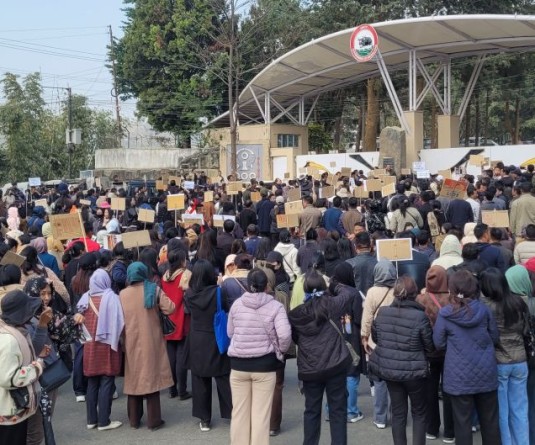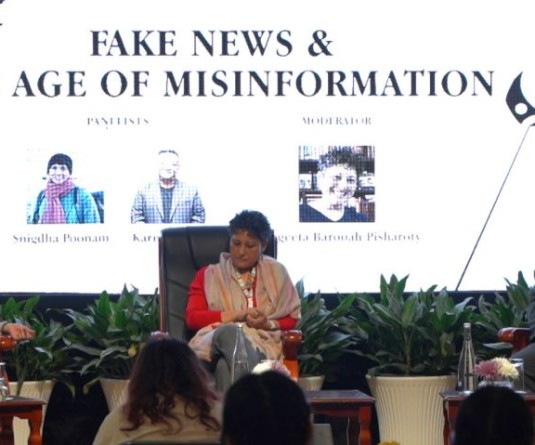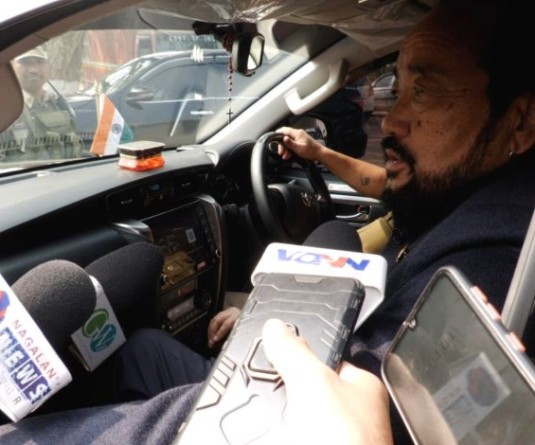
Kohima, January 28 (MExN): With the general election to the Legislative Assemblies of Meghalaya, Nagaland and Tripura scheduled in February, the Election Commission of India (ECI) today issued advisory for media coverage during the elections under the Section 126 of the Representation of the People Act, 1951.
According to an official release, The Act “prohibits displaying any election matter by means, inter alia, of television or similar apparatus, during the period of 48 hours before the hour fixed for conclusion of poll in a constituency.”
Assembly elections will be held in Tripura on February 16, while Meghalaya and Nagaland go to polls on the same day on February 27.
The relevant portions of the Section 126 reproduced by the ECI informed that public meeting is prohibited would “be held during period of forty-eight hours ending with hour fixed for conclusion of poll.”
It further prohibits displaying to the public any election matter by means of cinematograph, television or other similar apparatus in “any polling area during the period of forty-eight hours ending with the hour fixed for the conclusion of the poll for any election in the polling area.
“Election matter” means any matter intended or calculated to influence or affect the result of an election, elaborated the ECI.
“Any person who contravenes the provisions of sub-section (1) shall be punishable with imprisonment for a term which may extend to two years, or with fine, or with both,” the Section reads.
The Commission further reiterated that the “TV/Radio channels and cable networks/internet website/social media platforms should ensure that the contents of the programmes telecast/broadcast/ displayed by them during the period of 48 hours referred to in Section 126 do not contain any material, including views/appeals by panelists/participants that may be construed as promoting/ prejudicing the prospect of any particular party or candidate(s) or influencing/ affecting the result of the election.”
Among other things, it included display of any opinion poll and of standard debates, analysis, visuals and sound-bytes.
In this connection, the ECI also drew the media’s attention to “Section 126A of the R.P. Act 1951, which prohibits conduct of Exit poll and dissemination of its results during the period mentioned therein, i.e. the hour fixed for commencement of poll in first phase and half an hour after close of poll in last phase in the States.”
Meanwhile, for any period not covered by Section 126, concerned TV/Radio/Cable/FM channels/internet websites/Social Media platforms are free to approach the state/ district/local authorities for necessary permission for conducting any broadcast/Telecast related events (other than exit polls), the ECI said.
However, such activities must also conform to the provisions of the Model Code Of Conduct, the programme code laid down by the Ministry of Information and Broadcasting under the Cable Network (Regulation) Act with regard to decency, maintenance of communal harmony, etc, it advised.
All Internet websites and Social Media platforms must also comply with the provisions of The Information Technology Act, 2000, Information Technology (Intermediary Guidelines and Digital Media Ethics Code) Rules, 2021 and ECI guidelines dated October 26, 2013, it added.
All political advertisement needs pre-certification by the Committees set up at State/District level as per another order by the Commission dated April 15, 2004.
Further, the ECI also informed that no political party or candidate or any other organisation or person shall publish any advertisement in the print media on poll day and one day prior to poll day, unless the contents of political advertisements are got Pre-certified by them from the Media certification & Monitoring Committee (MCMC) at the State/District level, as the case may be.
The applicants shall have to apply to MCMC not later than 2) days prior to the proposed date of publication of such advertisements, it added.
Specific advisory to different media platforms
In addition, the ECI stated that different media outlets print, electronic and social media platforms must also adhere to guidelines issues by their respective industry’s guidelines.
Accordingly, the print media was told to observed the guidelines issuedby the Press Council of India on 30.07.2010 as well as the ‘Norms of Journalistic Conduct- (2020)’ during the election.
For electronic media, it is "Guidelines for Election Broadcasts" issued by the News Broadcasting Standards Authority (NBSA) on March 3, 2014.
Meanwhile, to ensure free, fair & ethical usage of their platforms, the social media platforms were told to adhere to “Voluntary Code of Ethics” developed by the Internet and Mobile Association of India (IAMAI)
As agreed by IAMAI, vide letter dated 23.09.2019, the 'Voluntary Code of Ethics’ shall be observed during all elections and is also applicable to upcoming general elections to the Legislative Assembly of Meghalaya, Nagaland & Tripura, 2023, the ECI informed.
“Attention is also drawn to IT (Guidelines for Intermediaries and Digital Media Ethics Code) Rules 2021 for compliance wherever applicable,” it added.
Industry-Wise Guidelines on Coverage during Election*
FOR PRINT MEDIA: Press Council of India
1. It will be the duty of the Press to give objective reports about elections and the candidates. The newspapers are not expected to indulge in unhealthy election campaigns, exaggerated reports about any candidate/party or incident during the elections.
2. Election campaign along communal or caste lines is banned under the election rules. Hence, the Press should avoid reports, which tend to promote feelings of enmity or hatred between people on the ground of religion, race, caste, community or language.
3. Refrain from publishing false or critical statements in regard to the personal character and conduct of any candidate… & unverified allegations against any candidate/party.
4. Shall not accept any kind of inducement, financial or otherwise, to project a candidate/party. It shall not accept hospitality or other facilities offered to them by or on behalf of any candidate/party.
5. Not expected to indulge in canvassing of a particular candidate/party.
6. Not accept/publish any advertisement at the cost of public exchequer regarding achievements of a party/government in power.
7. Observe all the directions/orders/instructions of the Election Commission/Returning Officers or Chief Electoral Officer issued from time to time.
PAID NEWS
8. Columns of news items which largely indicate names of voters on Caste basis and supporters of the candidate of particular political party, such tenor and manner of presentation of news establish the report to be paid news.
9. Political news published in competing newspaper with similar content strongly suggests such reports to be paid news.
10. Two newspapers publishing same news item verbatim during election days is not accidental and it is evident that such news items have been published for consideration.
11. Manner of presentation of a news item in a favor of a particular party and also the appeal for voting in a favor of a particular party is suggestive of paid news.
12. Projecting a candidate’s success in Election who is yet to file a nomination is suggestive of paid news.
13. News Reports on Campaign meeting and states enthusiasm because film stars were present cannot be termed as paid news.
14. While covering news on election, the newspapers are advised to ensure balance in publishing report/interview of candidates.
FOR ELECTRONIC MEDIA: News Broadcasting Standards Authority
1. News broadcasters should endeavor to inform the public in an objective manner, about relevant electoral matters, political parties, candidates, campaign issues and voting processes.
2. News channels shall disclose any political affiliations, either towards a party or candidate.
3. Avoid all forms of rumour, baseless speculation and disinformation, particularly when these concern specific political parties or candidates.
4. Must resist all political and financial pressures which may affect coverage of elections and election related matters.
5. Should maintain a clear distinction between editorial and expert opinion carried on their news channels.
6. News broadcasters that use video feed from political parties should disclose it and appropriately tagged.
7. Special care must be taken to ensure that every element of news/programmes dealing with elections and election related matters is accurate on all facts relating to events, dates, places and quotes…
8. News broadcasters, their journalists and officials must not accept any money, or valuable gifts, or any favour that could influence or appear to influence, create a conflict of interest or damage the credibility of the broadcaster or their personnel.
9. Must not broadcast any form of ‘hate speech’ or other obnoxious content that may lead to incitement of violence or promote public unrest or disorder as election campaigning based on communal or caste factors is prohibited under Election Rules.
10. Required to scrupulously maintain a distinction between news and paid content. All paid content should be clearly marked as “Paid Advertisement” or “Paid Content”: and paid content must be carried in compliance with the “Norms & Guidelines on Paid News” dated 24.11.2011 issued by NBA.
11. The ECI will monitor the broadcasts made by news broadcasters from the time elections are announced until the conclusion and announcement of election results. Any violation by member broadcasters reported to the NBSA by the Commission will be dealt by the NBSA under its regulations.
For Social Media Platform: IAMAI
• “Voluntary Code of Ethics” developed by the Internet and Mobile Association of India (IAMAI) for all the participating social media platforms to ensure free, fair & ethical usage of their platforms to maintain integrity of electoral process during the General Elections to the Lok Sabha 2019. As agreed by IAMAI, the “Voluntary Code of Ethics” shall be observed during all elections. Accordingly, the Code is also applicable in general election to the Legislative Assembly of Meghalaya, Nagaland & Tripura, 2023.
• Attention is also drawn to IT (Guidelines for Intermediaries and Digital Media Ethics Code) Rules 2021 for compliance wherever applicable.
IAMAI’s “Voluntary Code of Ethics” for Social Media Platforms:
1. Participants will endeavour to, where appropriate and keeping in mind the principle of freedom of expression, deploy appropriate policies and processes to facilitate access to information regarding electoral matters on their products and/ or services.
2. Participants will endeavour to voluntarily undertake information, education and communication campaigns to build awareness including electoral laws and other related instructions. Participants will also endeavour to impart training to the nodal officer at ECI on their products/ services, including mechanism for sending requests as per procedure established by law.
3. Participants and the Election Commission of India (ECI) have developed a notification mechanism by which the ECI can notify the relevant platforms of potential violations of Section 126 of the Representation of the People Act, 1951 and other applicable electoral laws in accordance with procedures established by law. These valid legal orders will be acknowledged and/ or processed within 3 hours for violations reported under Section 126 as per the Sinha Committee recommendations. All other valid legal requests will be acted upon expeditiously by the Participants, based on the nature of reported violation.
4. Participants are creating/opening a high priority dedicated reporting mechanism for the ECI and appoint dedicated person(s)/teams during the period of General Elections to interface with and to exchange feedback as may assist with taking expeditious action upon receipt of such a lawful request, following due legal process, from the ECI.
5. Participants will provide a mechanism for relevant political advertisers, in accordance with their obligations under law, to submit pre-certificates issued by ECI and/or Media Certification & Monitoring Committee (MCMC) of the ECI in relation to election advertisements that feature names of political parties, candidates for the ongoing Assembly Elections. Further, Participants shall expeditiously process/action paid political advertisements lawfully notified to Participants by the ECI that do not feature such certification.
6. Participants will commit to facilitating transparency in paid political advertisements, including utilising their pre-existing labels/ disclosure technology for such advertisements.
7. Participants will, pursuant to a valid request received from the ECI, via Internet and Mobile Association of India (IAMAI) provide an update on the measures taken by them to prevent abuse of their respective platforms.
8. IAMAI will coordinate with its participant members on the steps carried out under this Code and IAMAI as well as Participants will be in constant communication with the ECI during the election period.
The is abridged from “General Election to the Legislative Assemblies of Meghalaya, Nagaland & Tripura, 2023- Media Coverage during the period referred to in Section 126 of the R.P. Act, 1951” of an advisory issued by the Election Commission of India on January 28.
For full version, check here:
https://pib.gov.in/PressReleasePage.aspx?PRID=1894236
https://eci.gov.in/files/category/11-press-releases/






